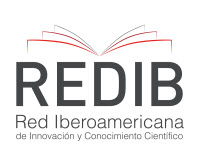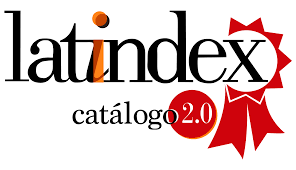
Esta obra está bajo una licencia internacional Creative Commons Atribución-NoComercial-CompartirIgual 4.0.
Esta obra está bajo licencia internacional https://creativecommons.org/licenses/by-nc-sa/4.0/deed.es
La revista (y sus contenidos) emplean las licencias Creative Commons, específicamente la del tipo CC BY NC SA 4.0, la cual establece que “el beneficiario de la licencia tiene el derecho de copiar, distribuir, exhibir y representar la obra y hacer obras derivadas siempre y cuando reconozca y cite la obra de la forma especificada por el autor o el licenciante”. La licencia del tipo CC BY NC SA 4.0 contempla tres categorías,
- Atribución.
- No Comercialización de la obra.
- Compartir igual
Los lectores son libres de:
- Compartir — copiar y redistribuir el material en cualquier medio o formato
- Adaptar — remezclar, transformar y construir a partir del materialLa licenciante no puede revocar estas libertades en tanto usted siga los términos de la licencia
- Siempre y cuando se respeten y contemplen la atribución de autoría y la no comercialización del material.
Resumen
La investigación tenía como objetivo analizar el uso del coaching y su relación con el desarrollo del liderazgo y de otras habilidades blandas y describir el estatus del coaching en las empresas en Panamá. Se entrevistaron 20 empresas, 7 multinacionales, 5 regionales y 8 nacionales, de media a grande dimensión, en la ciudad de Panamá, con procesos de coaching en los últimos tres años. La información fue recogida entre marzo y julio de 2018, y la misma fue analizada a través de estadística descriptiva y análisis de contenido. El desarrollo del liderazgo y de la comunicación fueron simultáneamente las motivaciones y los beneficios percibidos más mencionados por las empresas para implementar procesos de coaching. Los procesos efectuados por coaches externos derivan mayoritariamente de necesidades puntales y enfocan en niveles gerenciales y directivos. Cerca de un tercio de las empresas consideró tener una cultura de coaching. La mayoría de las empresas no consideró aplicar instrumentos para medición de los beneficios. La investigación aportó conocimiento sobre la utilización del coaching en las empresas en Panamá, principales motivaciones y beneficios percibidos a nivel de desarrollo del liderazgo, competencias y habilidades blandas.
Palabras clave:
Citas
Baptista, D. and Flores-Lima, R. (2016). Capacitación y Reclutamiento de Personal en los establecimientos de Panamá. BID Banco Interamericano de Desarrollo
Boyatzis, R.E., Smith, M.L., Van Oosten, E. & Woolford, L., (2013), ‘Developing resonant leaders through emotional intelligence, vision and coaching’, Organizational Dynamics 42(1), 17–24. [online] Available at: https://doi.org/10.1016/j.orgdyn.2012.12.003
Cardon, A. (2011). Coaching de Equipos. Barcelona: Gestion 2000.
Cox, E.; Bachkirova, T. and Clutterbuck, D. (2014). The Complete Handbook of Coaching. 2nd ed. London: Sage Publications.
David Megginson, David Clutterbuck, (2006), Creating a coaching culture, Industrial and Commercial Training, Vol. 38 Issue: 5, pp.232-237, Available at: https://doi.org/10.1108/00197850610677670
Deloitte (2017). 2017 Deloitte Global Human Capital Trends. [online] Available at: https://www2.deloitte.com/am/en/pages/human-capital/articles/introduction-human-capital-trends-2017.html.
Diedrich, R.C. (1996). An interactive approach to executive coaching. Consulting Psychology Journal: Practice & Research, 48(2), 61–66. [online] Available at: https://doi.org/10.1037/1061-4087.48.2.61
Dippenaar, M. & Schaap, P., (2017), ‘The impact of coaching on the emotional and social intelligence competencies of leaders’, South African Journal of Economic and Management Sciences 20(1), a1460. Available at: https://sajems.org/index.php/sajems/article/view/1460
Doyle, A. (2018). Here is a Look at the Most Important Soft Skills That Employers Seek. [online] The Balance Careers. Available at: https://www.thebalance.com/top-soft-skills-2063721.
FYI. For your improvement. (2014). 6th ed. Korn Ferry.
Goldsmith, M., Greenberg, C., Robertson, A. and Hu-Chan, M. (2003). Global Leadership. The Next Generation. New Jersey: Pearson Education Inc.
ICF International Coach Federation and HCI Human Capital Institute (2014). Building a coaching culture. [online] Available at: https://coachfederation.org/research/building-a-coaching-culture.
Icf-es.com. (n.d). Definición del coaching según ICF. [online] Available at: https://www.icf-es.com/mwsicf/sobreicf/definicion-coaching-icf-espana.
International Coach Federation and PricewaterhouseCoopers LLP (2017). ICF - Consumer Awareness Study. [online] Available at: https://coachfederation.org/research/consumer-awareness-study .
ICF International Coach Federation and PricewaterhouseCoopers LLP (2016). ICF Global Coaching Study. [online] Available at: https://coachfederation.org/research/global-coaching-study.
Flores, M. and Melguizo, A. (2018). América Latina tiene la mayor brecha de habilidades del mundo. A continuación, te mostramos cómo arreglarlo. [online] Foro Económico Mundial. Available at: https://es.weforum.org/agenda/2018/03/america-latina-tiene-la-mayor-brecha-de-habilidades-del-mundo-a-continuacion-te-mostramos-como-arreglarlo .
Grant, A.M, O’Connor, S.A. (2018). Broadening and building solution-focused coaching: feeling good is not enough, Coaching: An International Journal of Theory, Research and Practice. Available at: https://doi.org/10.1080/17521882.2018.1489868
Grant, A.M. (2014). The Efficacy of Executive Coaching in Times of Organizational Change, Journal of Change Management, 14:2, 258-280, DOI: 10.1080/14697017.2013.805159 Available at: https://doi.org/10.1080/14697017.2013.805159
Grant, A. M., Cavanagh, M. J., & Parker, H. M. (2010). The State of Play in Coaching Today: A Comprehensive Review of the Field International Review of Industrial and Organizational Psychology 2010 (pp. 125–167). Wiley-Blackwell.
Grant, A.M., Curtayne, L. and Burton, G. (2009). Executive coaching enhances goal attainment, resilience and workplace well-being: a randomised controlled study. The Journal of Positive Psychology Vol. 4, No. 5, September 2009, 396–407. Coaching Psychology Unit, School of Psychology, University of Sydney, Sydney, NSW, Australia
Goldsmith, M. (2009). Executive coaching: a real-world perspective from a real-life coaching practitioner. International Coaching Psychology Review, 4(1), 22–24.
Kiel, F., Rimmer, E., Williams, K., & Doyle, M. (1996). Coaching at the top. Consulting Psychology Journal: Practice & Research, 48(2), 67–77. [online] Available at: https://doi.org/10.1037/1061-4087.48.2.67
Jones, R.J., Woods, S.A. & Guillaume, Y.R.F., 2016, ‘The effectiveness of workplace coaching: A meta-analysis of learning and performance outcomes from coaching’, Journal of Occupational and Organizational Psychology 89(2), 249–277. [online] Available at: https:// doi.org/10.1111/joop.12119
ManpowerGroup. (2018). Robots Need Not Apply: Human Solutions in the Skills Revolution - ManpowerGroup. [online] Available at: http://www.manpowergroup.co.uk/the-word-on-work/skills-revolution-human-solutions/.
McAlpin, K. (n.d.). Return on investment - Performance Coaching. [online] Performance Coaching. Available at: https://www.performancecoachinginternational.com/return-on-investment/.
Passmore, J., Fillery-Travis, A (2011) A critical review of executive coaching research: a decade of progress and what's to come, Coaching: An International Journal of Theory,
Research and Practice, 4:2, 70-88, Available at: https://doi.org/10.1080/17521882.2011.596484
Theeboom, T., Beersma, B., & van Vianen, A. E. (2014). Does coaching work? A meta-analysis on the effects of coaching on individual level outcomes in an organizational context. The Journal of Positive Psychology, 9(1), 1–18. Available at: https://doi.org/10.1080/17439760.2013.837499
Tobias, L.L. (1996). Coaching executives. Consulting Psychology Journal: Practice and Research, 48(2), 87_95.
Whitmore, J. (2005). Coaching. El método para mejorar el rendimiento de las personas. Los principios y la práctica del coaching y del liderazgo. Barcelona: Paidós.
Zeus, P. and Skiffington S. (2002). Guía completa del coaching en el trabajo. Madrid: Mcgraw-Hill.
World Economic Forum (2017). The Global Competitiveness Report 2017–2018. [online] Available at: https://coachfederation.org/research/global-coaching-study.
World Economic Forum (2016). The Future of Jobs. [online] Available at: http://reports.weforum.org/future-of-jobs-2016/


















